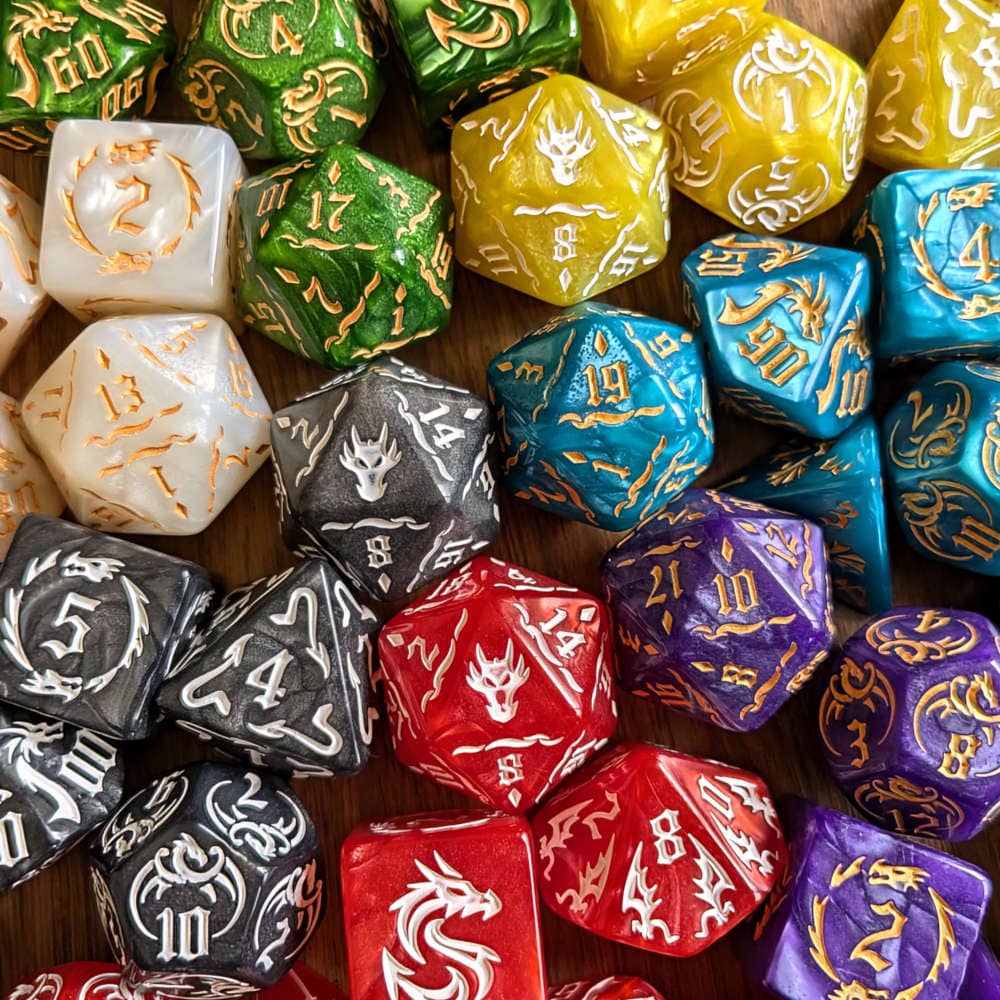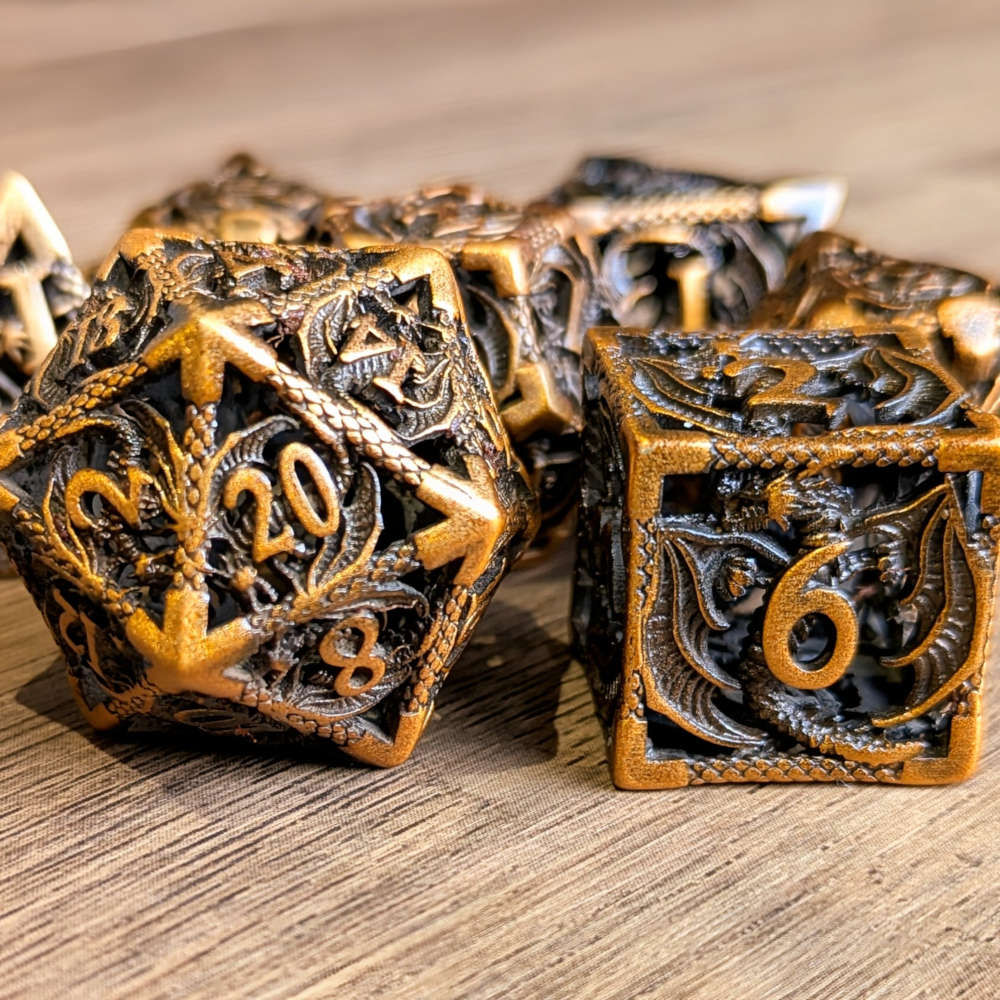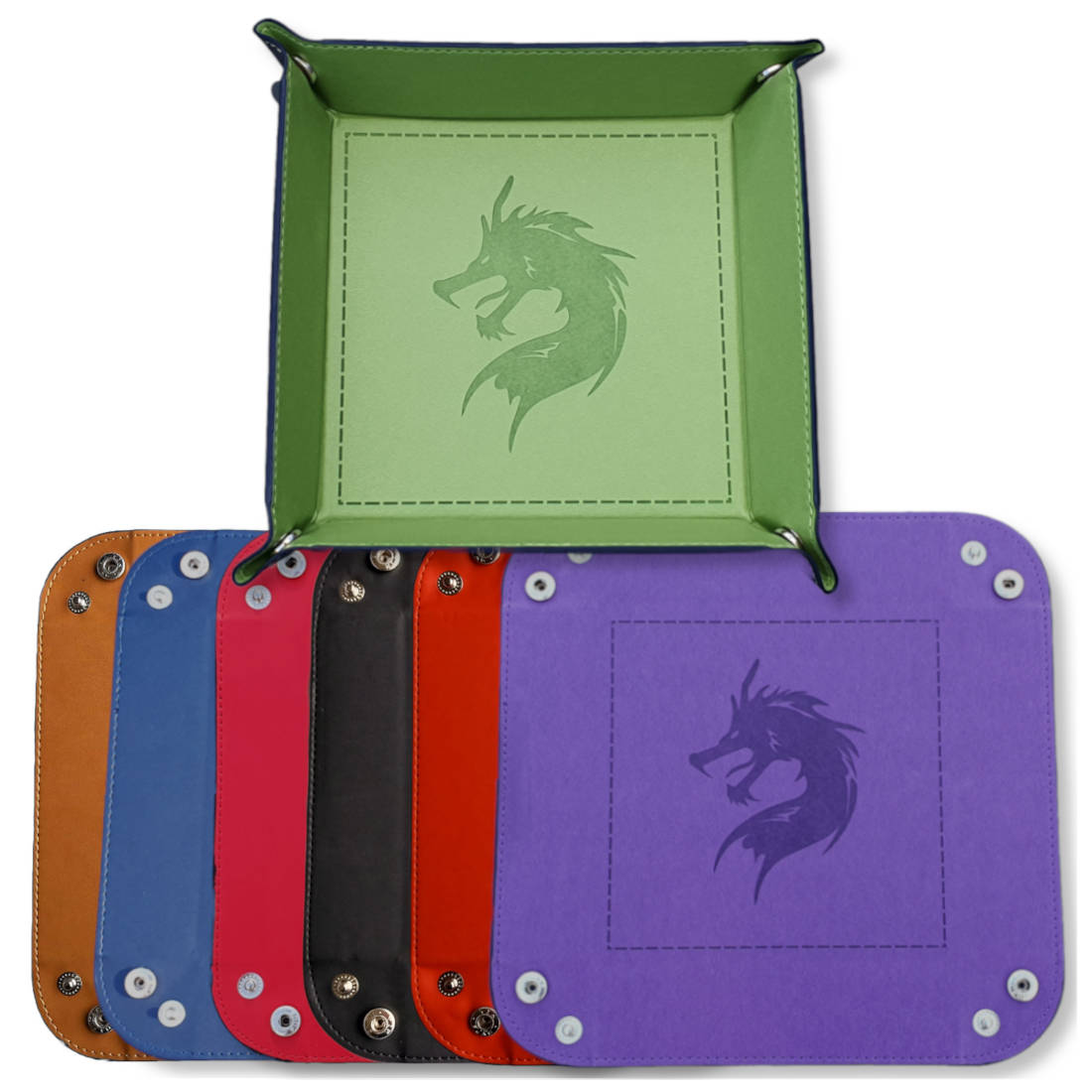How to avoid scam D&D dice shops

The number of scam shops targeting Dungeons & Dragons and wider TTRPG players has increased in recent years. At Dice Dragons, we want to help you stay safe when shopping for dice online. This guide explains the common signs of a fake dice shop, highlights known community-reported scam sites, and shares what you can do if you think you have been targeted.
Why scam dice shops are becoming more common
The D&D and TTRPG hobby continues to grow, and with that growth comes more demand for dice. Unfortunately, some bad actors try to take advantage of this by setting up websites that look like real dice stores but never deliver what you purchase. These shops often rely on misleading marketing, stolen product photos, and other deceitful tactics to appear legitimate.
Common signs of a scam D&D dice shop
Use the following red flags to help you protect yourself when buying dice online.
1. Prices that are too good to be true
If a shop sells “premium gemstone dice” for only a few pounds, or offers extremely low prices with very high shipping costs, be cautious. This is a common tactic used to lure buyers into a purchase, and either not deliver on what they promised or deliver a sub-par product.
2. Misleading marketing tactics
Scam dice shops often rely on exaggerated claims such as:
- “We’re closing down”
- “Warehouse clearance”
- “Free dice today only”
- Countdown timers that reset when you reload the page
- Large “80-90% off” banners on every product

Above: Facebook ads from scam dice shops using misleading marketing claims.
These tactics are designed to create false urgency and push you into a quick purchase.
3. Inconsistent or stolen product photography
Legitimate dice shops usually use consistent photography styles and lighting. Scam shops often steal images from multiple creators, so their product photos look mismatched in quality, background, or style.
If you notice:
- Different lighting styles on similar products
- Blurry or heavily compressed images
- Pictures you recognise from well-known makers
- Poorly edited or clearly AI-generated images
…it’s best to avoid the shop.
4. Odd or poorly written text
Many scam sites use automatic translation tools, which often results in awkward or unnatural English, strange phrasing, and product titles that do not match the photos
If the wording feels “off”, treat it as a warning sign.
5. Unprofessional contact details
A genuine business will normally use a business email address tied to its domain. If a shop only lists a free email account (for example, @gmail.com) in its “Contact Us” section, this can be a red flag.
Running a professional email address is inexpensive, so a shop avoiding it is often suspicious.
6. No address or clear company information
Trustworthy stores usually provide at least:
- A physical address
- Company registration details
- Clear “About Us” information
- Country of operation
- Names of people involved in the store
- Terms and conditions
- Privacy policy
- Delivery and returns policies
If a shop hides all of this, or provides vague or conflicting information, avoid purchasing.
7. Reported scam sites and community reports
Some online shops have been repeatedly reported within the dice-collecting community for failing to deliver orders, using stolen images, or misleading customers. These include shops such as Dice Legend, which many players have flagged as problematic.
There is a list of known scam dice shops based on community reports. If a shop you’re considering appears on that list, do not order from them and investigate further.
8. Fake affiliate discount codes
Another common issue our customers have encountered involves fake discount-code websites, such as Tenereteam. These sites claim to offer voucher codes for hundreds of online shops. In many cases, the codes do not exist, have never existed, or are guessed automatically.
It isn’t clear why sites such as Tenereteam are using false and misleading information about dice shops like Dice Dragons. However, we do know that it’s important to be careful about which websites you click on and trust with your personal information. We advise our customers to avoid websites like Tenereteam and to remember that we will never ask for personal information such as card details, passwords, or any other sensitive data.
Read more about legitimate Dice Dragons discount codes.
9. Lack of reviews or poor ratings
There are legitimate reasons why a dice shop might not have many reviews. They might be a small independent creator, or they might be a newly established dice shop. Have a look for their reviews online by searching ‘[brand name] reviews’ in your search engine.
You can check their reviews on places like Trustpilot and Google Reviews. If they don’t have many reviews, if their Trustpilot profile is unclaimed, or if most of their reviews are 1 or 2-star, then that’s a warning sign that you should research further and consider using another dice shop.
What to do if you are scammed by a dice shop
If you believe you have ordered from a fake dice shop, it can be tricky to know what to do to get your money back. Below is a suggested course of action from our decades of experience buying and selling online.
Contact the shop directly: This might sound counter-intuitive, but by contacting the shop at the first sign of trouble, you are building a paper trail of evidence that you can later give to your payment provider to show that you’ve been scammed. Save a copy of the email you send, and keep copies of any replies you receive.
Gather evidence: Take copies of order confirmation emails, any messages you exchanged, misleading adverts, screenshots of the product pages, photos of any sub-quality products you received, poor reviews, and any other evidence that shows you have been scammed. This helps support your case.
Contact your payment provider: Request a chargeback or dispute the transaction. Explain that the shop appears to be fraudulent or has not delivered your order. Provide the evidence you have gathered and explain the situation to them. They should be able to help.
In the UK, if you paid with a credit card, you may be covered by something called Section 75 protection. This can help if you bought high-value items or made several purchases from a scam dice shop. However, there are limits to this, so you might not be eligible. And if you paid with a debit card instead, Section 75 won’t apply - this is where a chargeback can help you.
We suggest reading the Money Saving Expert guides on Section 75 refunds and Chargebacks for more information, or calling your payment provider so they can guide you through the process.
Report the website: You can report scam dice shop websites through:
- Your country’s consumer protection service (in the UK, this could be a report to Trading Standards via Citizens Advice)
- Your country’s fraud and cybercrime service (in the UK, this is Action Fraud)
- Your browser’s “Report unsafe website” option
- If you saw an ad for the scam dice shop on social media, you can report both the ad and the page that paid to display it
Reporting helps protect other players in the community.
Scam dice shops can be frustrating, especially when you are excited to expand your collection. By looking out for the signs above and sticking to reputable retailers, you can shop with confidence. If you ever have doubts about a dice shop, take a moment to research it, check community reviews, and trust your instincts. If something seems off, or too good to be true, maybe it is.
Choose trusted and transparent dice shops
There are many honest and passionate dice sellers in the TTRPG community. At Dice Dragons, we are committed to transparency and reliability. We use our own product photography, provide clear contact information, and support our customers with genuine service.
Buying D&D dice and TTRPG accessories from trusted shops helps ensure the hobby remains safe and enjoyable for everyone.
Whether you choose to buy from us or another retailer, we hope that everyone in the TTRPG community can enjoy the dice and accessories that bring joy to them and their friends on their adventures.





